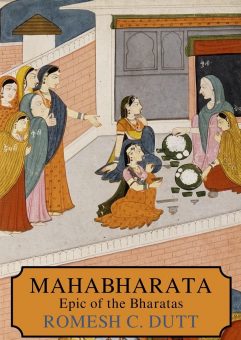Among these various legends and tales I have selected one which is singular and striking. The great truth proclaimed under the thin guise of an eastern allegory is that a True Woman’s Love is not conquered by Death. The story is known by Hindu women high and low, rich and poor, in all parts of India; and on a certain night in the year millions of Hindu women celebrate a rite in honour of the woman whose love was not conquered by death. Legends like these, though they take away from the unity and conciseness of the Epic, impart a moral instruction to the millions of India the value of which cannot be overestimated.
The portion translated in this Book forms Sections ccxcii. and ccxciii., a part of Section ccxciv. and Sections ccxcv. and ccxcvi. of Book iii. of the original text.
I. Forest Life
[253] In the dark and pathless forest long the Pandav brothers strayed,
In the bosom of the jungle with the fair Draupadi stayed,
And they killed the forest red-deer, hewed the gnarléd forest wood,
From the stream she fetched the water, cooked the humble daily food,
In the morn she swept the cottage, lit the cheerful fire at eve,
But at night in lonesome silence oft her woman’s heart would grieve,
Insults rankled in her bosom and her tresses were unbound, –
So she vowed, – till fitting vengeance had the base insulters found!
Oft when evening’s shades descended, mantling o’er the wood and lea,
When Draupadi by the cottage cooked the food beneath the tree,
Rishis came to good Yudhishthir, sat beside his evening fires,
Many olden tales recited, legends of our ancient sires.
Markandeya, holy rishi, once unto Yudhishthir came,
When his heart was sorrow-laden with the memories of his shame,
“Pardon, father!” said Yudhishthir, “if unbidden tears will start,
But the woes of fair Draupadi grieve a banished husband’s heart,
By her tears the saintly woman broke my bondage worse than death,
By my sins she suffers exile and misfortune’s freezing breath!
Dost thou, sage and saintly rishi, know of wife or woman born,
By such nameless sorrow smitten, by such strange misfortune torn,
Hast thou in thy ancient legends heard of true and faithful wife,
With a stronger wife’s affection, with a sadder woman’s life?”
“Listen, monarch!” said the rishi, “to a tale of ancient date,
How Savitri loved and suffered, how she strove and conquered Fate!”
II. The Tale of Savitri
[254] In the country of fair Madra lived a king in days of old,
Faithful to the holy BRAHMA, pure in heart and righteous-souled,
He was loved in town and country, in the court and hermit’s den,
Sacrificer to the bright gods, helper to his brother men,
But the monarch, Aswapati, son or daughter had he none,
Old in years and sunk in anguish, and his days were almost done!
Vows he took and holy penance, and with pious rules conformed,
Spare in diet as brahmachari many sacred rites performed,
Sang the sacred hymn, savitri, to the gods oblations gave,
Through the livelong day he fasted, uncomplaining, meek and brave!
Year by year he gathered virtue, rose in merit and in might,
Till the goddess of savitri smiled upon his sacred rite,
From the fire upon the altar which a holy radiance flung,
In the form of beauteous maiden, goddess of savitri sprung!
And she spake in gentle accents, blessed the monarch good and brave,
Blessed his rites and holy penance and a boon unto him gave:
“Penance and thy sacrifices can the Powers Immortal move,
And the pureness of thy conduct doth thy heart’s affection prove,
Ask thy boon, king Aswapati, from creation’s Ancient Sire,
True to virtue’s sacred mandate speak thy inmost heart’s desire.”
“For an offspring brave and kingly,” so the saintly king replied,
“Holy rites and sacrifices and this penance I have tried,
If these rites and sacrifices move thy favour and thy grace,
Grant me offspring, Prayer-Maiden, worthy of my noble race.”
Pages: 1 2 3 4 5 6 7 8 9 10 11 12 13 14 15 16 17 18 19 20 21 22 23 24 25 26 27 28 29 30 31 32 33 34 35 36 37 38 39 40 41 42 43 44 45 46 47 48 49 50 51 52 53 54 55 56 57 58 59 60 61 62 63 64 65 66 67 68 69 70 71 72 73 74 75 76 77 78 79 80 81




